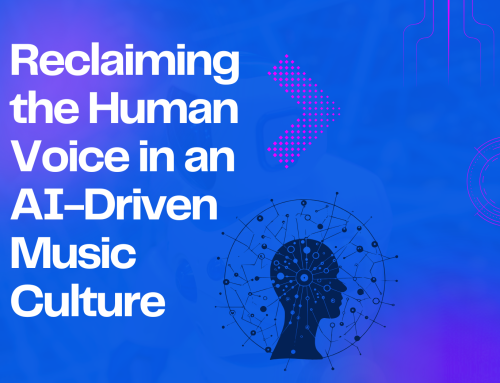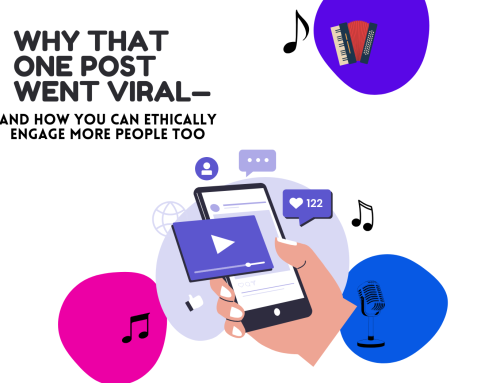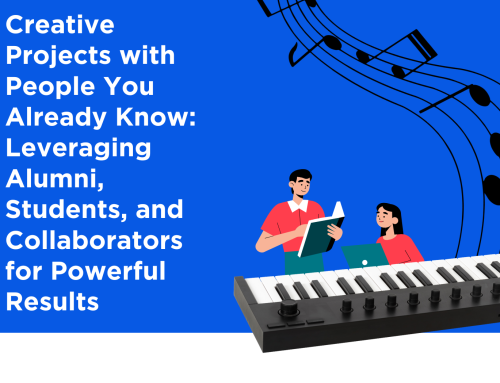On Friday, March 13th I spent my last day in public spaces. It’s funny to look back. I knew that there would be a couple of weeks in isolation, and I even looked forward to the change of pace! However, I never imagined that we would be facing some undefined amount of time with so many added stresses. I think for each person the added stresses look different. At first I tried taking the “I should be grateful approach” to my situation, but after listening to the Brené Brown podcast on Comparative Suffering, the 50/50 Myth, and Settling the Ball, I have learned to validate and accept my feelings instead of ignoring them. In working through some of my own grief, stress, and fear, I have also begun to understand that responses to COVID-19 are not just temporary solutions – they are the building blocks for a different future.
Forward thinking
So many existing articles predict how our society might be different after this isolation ends, and they make me wonder about the future of music education – especially at the collegiate level. During this time, we have certainly realized the value of human interaction. It is essential. But I also think we are witnessing first-hand how much learning can occur without students receiving information sitting before professors.
When the isolation first started, I had an idea to start a #musicservicelearning organization. I wanted to be proactive and stay connected, so I thought it might be useful to pair students who were feeling bored and wanting to help with music teachers who were tasked with the seemingly impossible challenge of moving to an all online-learning platform. Within one week I was overwhelmed with the responses from students signing up to help and teachers making requests. Many of the students had been displaced from student teaching, but there were also so many volunteering students who were not even through the methods sequence. Honestly, I wondered how these novice pre-service teachers would be able to contribute without having the classes that would give them important content for teaching. After all, they were still in the “musicianship” phase of our curriculum, working to make themselves better players and more knowledgeable about music fundamentals. What would they know about helping teachers at all?
Students were uncovering resources, experiencing teaching methods, and finding solutions for real-life parameters that exist in teaching all students effectively.
I started by pairing less experienced students with more experienced students, but quickly found out that was not necessary. If students were excited and engaged in the project, they were willing to give it everything! They were eager to grow and learn on the job and make sure the requesting teacher got the help they needed. In one week, I learned that the idea of project-based curriculum common at the secondary level was proving to have great value at the collegiate level as well. Students were uncovering resources, experiencing teaching methods, and finding solutions for real-life parameters that exist in teaching all students effectively.
Expanding the vision
At the end of two weeks, I realized that the outpouring of free resources was amazing, but also disorganized. I asked over 60 students to help me take on the task of curating all of the available resources, and they jumped at the opportunity to create https://msl.fflat-books.com. Currently this site offers over 200 curated resources sortable by discipline, level, and many other categories. This was probably the scariest project, because I didn’t know much about what I was doing. Fflat-books founders Sarah Gulish and David Allen were just teaching me. Was it possible for me to teach these students to do something I was learning myself? I quickly found out the answer was “yes!” See, I was able to guide the students, keep them organized, and help them think through complications, all while they took charge of their tasks and creatively came up with solutions to problems we encountered. Through this I learned that I didn’t have to be the person who knew everything in order to stand in front of my students and offer them something valuable. My experiences and knowledge certainly helped, but it was not the only requirement for learning to continue.
Through this I learned that I didn’t have to be the person who knew everything in order to stand in front of my students and offer them something valuable.
What’s next for service learning in music
As we come into the end of the 4th week, I am beginning to reflect on the lessons I am learning and see how they can contribute to a clearer vision for the future of collegiate music education. In addition to what I learned in the first few weeks, I am also learning that our students might need to develop a thirst for what they will study in college. Sure, they know they want to study music. They often know they loved and felt inspired by a high school music teacher. But they do not realize the full scope of music education. Because of this isolation, however, they are now realizing that the function of music education is greater than playing in ensembles and perfecting instrument technique. They are learning that music can unite and heal. They are learning how music functions in society. They are learning where they have shortcomings in their own skill and knowledge base to solve the problems they are tackling. And, they are learning all of this outside of the classroom.
I am sure I will continue growing as I reflect more. For now, I am left with a lot of questions based on what I’m learning during the COVID-19 isolation:
· What if we let students have guided teaching experiences earlier?
· What if we made service-learning a required part of all teacher preparation programs?
· What if we let students discover what they need to learn in a collegiate setting?
· What if we learned to step back and be part of guiding their process of learning?
I think answering these questions will help offer clarity and shape in order to better the necessary change for the future of collegiate music education. It’s going to be a long road, but I’m excited to be part of the change.




Leave A Comment